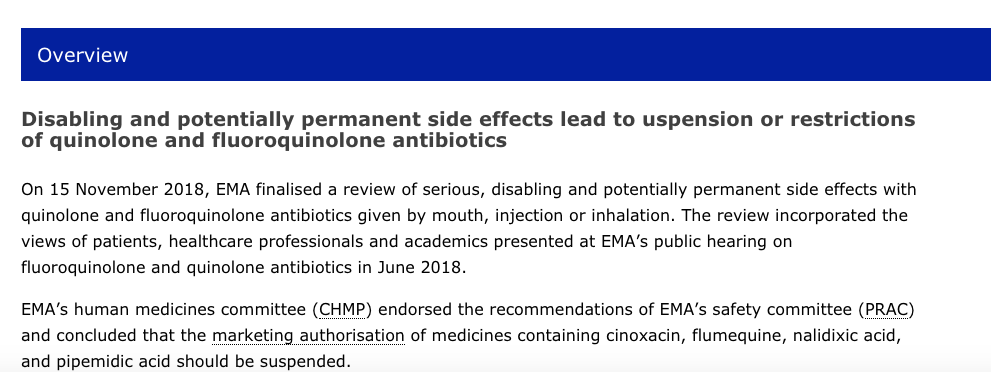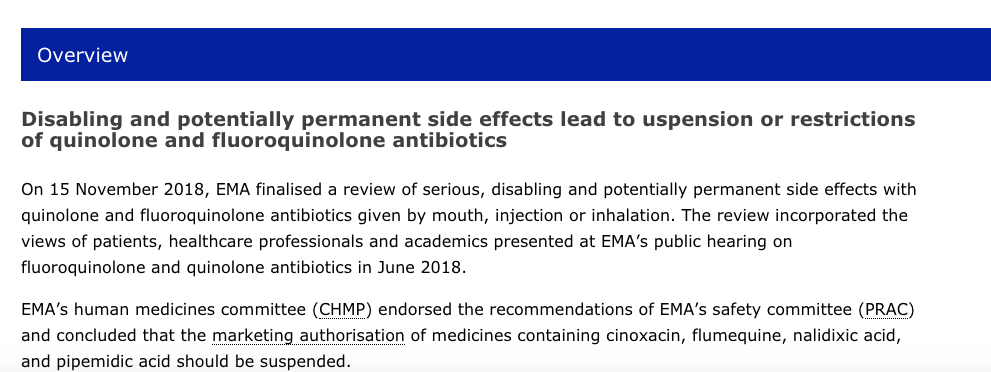
The European Medicines Agency (EMA) released their final decision regarding fluoroquinolones. You can read the EMA verdict in “Quinolone- and fluoroquinolone-containing medicinal products” and “Disabling and potentially permanent side effects lead to suspension or restrictions of quinolone and fluoroquinolone antibiotics” (both from the EMA web site). Additional information can be found on the UK Government web site in the article, “Fluoroquinolone antibiotics: new restrictions and precautions for use due to very rare reports of disabling and potentially long-lasting or irreversible side effects.” Changes to European fluoroquinolone labels can be viewed HERE.
Restrictions on the use of fluoroquinolone antibiotics will mean that they should not be used:
- to treat infections that might get better without treatment or are not severe (such as throat infections);
- to treat non-bacterial infections, e.g. non-bacterial (chronic) prostatitis;
- for preventing traveller’s diarrhoea or recurring lower urinary tract infections (urine infections that do not extend beyond the bladder);
- to treat mild or moderate bacterial infections unless other antibacterial medicines commonly recommended for these infections cannot be used.
Importantly, fluoroquinolones should generally be avoided in patients who have previously had serious side effects with a fluoroquinolone or quinolone antibiotic. They should be used with special caution in the elderly, patients with kidney disease and those who have had an organ transplantation because these patients are at a higher risk of tendon injury. Since the use of a corticosteroid with a fluoroquinolone also increases this risk, combined use of these medicines should be avoided.
Please excuse me for not knowing exactly how European drug regulation works (and please correct me if I am wrong), but it looks like the EMA makes recommendations, then the various European governments pass down instructions to their citizens.
The UK government web site gave the following recommendations to healthcare providers:
Advice for healthcare professionals:
- systemic (by mouth, injection, or inhalation) fluoroquinolones can very rarely cause long-lasting (up to months or years), disabling, and potentially irreversible side effects, sometimes affecting multiple systems, organ classes, and senses
- advise patients to stop treatment at the first signs of a serious adverse reaction, such as tendinitis or tendon rupture, muscle pain, muscle weakness, joint pain, joint swelling, peripheral neuropathy, and central nervous system effects, and to contact their doctor immediately for further advice – sheet for patients
do not prescribe fluoroquinolones:
-
for non-severe or self-limiting infections, or non-bacterial conditions
-
for some mild to moderate infections (such as in acute exacerbation of chronic bronchitis and chronic obstructive pulmonary disease; please refer to revised indications in the Summary of Product Characteristics) unless other antibiotics that are commonly recommended for these infections are considered inappropriate (see below)
-
ciprofloxacin or levofloxacin should no longer be prescribed for uncomplicated cystitis unless other antibiotics that are commonly recommended are considered inappropriate (see below)avoid use in patients who have previously had serious adverse reactions with a quinolone or fluoroquinolone antibiotic
-
prescribe with special caution for people older than 60 years and for those with renal impairment or solid-organ transplants because they are at a higher risk of tendon injury avoid use of a corticosteroid with a fluoroquinolone since co-administration could exacerbate fluoroquinolone-induced tendinitis and tendon rupture
-
report suspected adverse drug reactions to fluoroquinolone antibiotics on the Yellow Card website or via the Yellow Card app (download it from the Apple App Store, or Google Play Store)
I hate that they put “very rarely” into these warnings, seeing as adverse reactions to fluoroquinolones are woefully under-studied and the assertion that these effects are “rare” is based on assumption rather than fact. BUT, these prescriber guidelines, along with the EMA guidelines, are steps in the right direction, and hopefully they will cut unnecessary fluoroquinolone prescriptions significantly.
Here are a few notes about the proposed changes to the European Fluoroquinolone Warning Labels:
- It is recommended that fluoroquinolone use be restricted for uncomplicated cystitis, Acute exacerbation of chronic bronchitis and of chronic obstructive pulmonary disease, Acute bacterial rhinosinusitis, and Otitis media acute.
- The warning labels are still leaving a lot of discretion to doctors/prescribers, and state, “In [indication] [name of product] should be used only when it is considered inappropriate to use other antibacterial agents that are commonly recommended for the treatment of these infections.” even though other parts of the warning label note that FQs should not be used for that particular indication. I worry that this may lead to some confusion among doctors/prescribers.
- The new warning label notes that people who have experienced adverse reactions to fluoroquinolones in the past should not take fluoroquinolones. “The use of [INN] should be avoided in patients who have experienced serious adverse reactions in the past when using quinolone or fluoroquinolone containing products (see section 4.8). Treatment of these patients with [INN] should only be initiated in the absence of alternative treatment options and after careful benefit/risk assessment.”
- The possibility of prolonged, serious, and disabling side effects of fluoroquinolones are noted. “Prolonged, disabling and potentially irreversible serious adverse drug reactions
Very rare cases of prolonged (continuing months or years), disabling and potentially
irreversible serious adverse drug reactions affecting different, sometimes multiple, body
systems (musculoskeletal, nervous, psychiatric and senses) have been reported in patients
receiving quinolones and fluoroquinolones irrespective of their age and pre-existing risk
factors. [INN] should be discontinued immediately at the first signs or symptoms of any
serious adverse reaction and patients should be advised to contact their prescriber for
advice.” - I’m slightly shocked that the risk of tendon problems is just-now being added to European warning labels, but it is one of the changes noted. “Tendinitis and tendon rupture (especially but not limited to Achilles tendon), sometimes bilateral, may occur as early as within 48 hours of starting treatment with quinolones and fluoroquinolones and have been reported to occur even up to several months after discontinuation of treatment. The risk of tendinitis and tendon rupture is increased in older patients, patients with renal impairment, patients with solid organ transplants, and those treated concurrently with corticosteroids. Therefore, concomitant use of corticosteroids should be avoided. At the first sign of tendinitis (e.g. painful swelling, inflammation) the treatment with [INN] should be discontinued and alternative treatment should be considered. The affected limb(s) should be appropriately treated (e.g. immobilisation). Corticosteroids should not be used if signs of tendinopathy occur.”
- Warnings about peripheral neuropathy are also added. “Cases of sensory or sensorimotor polyneuropathy resulting in paraesthesia, hypaesthesia, dysesthesia, or weakness have been reported in patients receiving quinolones and fluoroquinolones. Patients under treatment with [INN] should be advised to inform their doctor prior to continuing treatment if symptoms of neuropathy such as pain, burning, tingling, numbness, or weakness develop in order to prevent the development of potentially irreversible condition.”
- Permanently disabling effects are noted again, “*Very rare cases of prolonged (up to months or years), disabling and potentially irreversible serious drug reactions affecting several, sometimes multiple, system organ classes and senses (including reactions such as tendonitis, tendon rupture, arthralgia, pain in extremities, gait disturbance, neuropathies associated with paraesthesia, depression, fatigue, memory impairment, sleep disorders, and impairment of hearing, vision, taste and smell) have been reported in association with the use of quinolones and fluoroquinolones in some cases irrespective of pre-existing risk factors.”
- Disappointingly, the “Package leaflet: Information for the patient” is full of the words “very rarely” when referring to all the potential effects of fluoroquinolones. Again, the exact rate of adverse reactions to fluoroquinolones is unknown (and may be unknowable because of delayed adverse reactions), and I think that it’s a dis-service to patients to downplay the possibility of these serious and severe effects of fluoroquinolones.
THANK YOU, THANK YOU, THANK YOU to all the European advocates that pushed for these changes in fluoroquinolone warnings and prescribing. You have made an enormous difference, and hopefully rates of fluoroquinolone prescriptions will decrease significantly because of your advocacy.
*****











… [Trackback]
[…] Info to that Topic: floxiehope.com/ema-final-decision-re-fluoroquinolones/ […]
… [Trackback]
[…] Find More here to that Topic: floxiehope.com/ema-final-decision-re-fluoroquinolones/ […]
… [Trackback]
[…] Read More Info here to that Topic: floxiehope.com/ema-final-decision-re-fluoroquinolones/ […]
… [Trackback]
[…] Read More on that Topic: floxiehope.com/ema-final-decision-re-fluoroquinolones/ […]